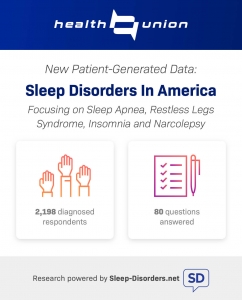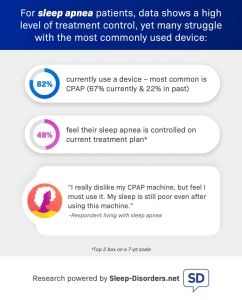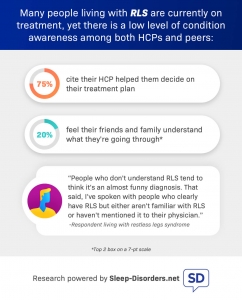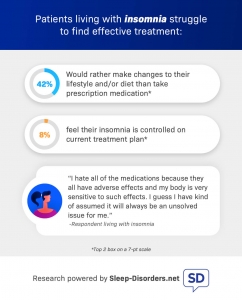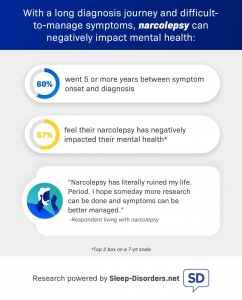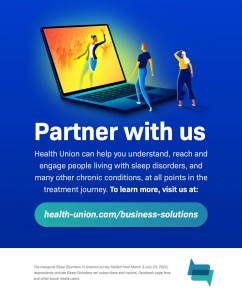Sleep Disorders In America
New Health Union survey data helps the healthcare industry better understand and reach people living with sleep disorders
For the first time, Health Union has gathered patient-reported data from thousands of real people impacted by sleep disorders–specifically sleep apnea, restless legs syndrome, insomnia and narcolepsy. The first annual Sleep Disorders In America survey, a syndicated research study from Health Union, quantifies the true impact of this condition among patients – going beyond basic demographics and symptoms to establish a deep understanding of the holistic patient journey for those affected and to track trends over time.
The new data from the first annual Sleep Disorders In America survey reveals deep insights of a population of 2,198 diagnosed patients and dive further into specific experiences based on their condition. For sleep apnea patients, data shows a high level of treatment control, yet many struggle with the most commonly used device: 48% feel their sleep apnea is controlled on their current treatment plan* and 82% currently use use a device–CPAP being the most common. However, one respondent writes, “I really dislike my CPAP machine, but I feel I must use it. My sleep is still poor even after using this machine.”
Many people living with RLS are currently on treatment, yet there is a low level of condition awareness among both HCPs and peers: 75% cite their HCP helped them decide on their treatment plan and only 20% feel their friends and family understand what they’re going through.* One respondent writes, “People who don’t understand RLS tend to think it’s an almost funny diagnosis. That said, I’ve spoken with people who clearly have RLS but either aren’t familiar with RLS or haven’t mentioned it to their physician.”
Patients living with insomnia struggle to find effective treatment: only 8% feel their insomnia is controlled on their current treatment plan and 42% say they would rather make changes to their lifestyle and/or diet than take prescription medication.* “I hate all of the medications because they all have adverse effects and my body is very sensitive to such effects,” one respondent writes. “I guess I have kind of assumed it will always be an unsolved issue for me.”
With a long diagnosis journey and difficult-to-manage symptoms, narcolepsy can negatively impact mental health: 57% feel their narcolepsy has negatively impacted their mental health* and 60% went five or more years between symptom onset and diagnosis. A respondent writes, “Narcolepsy has literally ruined my life. Period. I hope someday more research can be done and symptoms can be better managed.”
This access to a broad base of knowledge, facts and data gleaned from Health Union’s open online health communities like Sleep-Disorders.net, and syndicated research allows the healthcare industry to harness the power of Health Union’s continuous immersion in the patient experience to deliver smarter insights and implications–so you can spend your time developing the strategies that will make a difference.
*Top-2 box on a 7-pt scale

